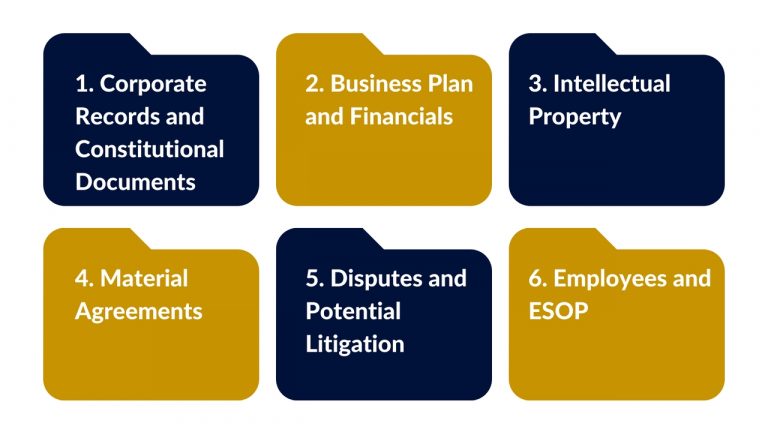The due diligence process is an inevitable stage in the growth of a business. Whether seeking investment at the fundraising stage or securing an exit or merger, founders must demonstrate the viability of their business to investors. This process enables investors to assess the strengths, weaknesses, uncertainties and risks associated with a venture before investing in it.
Our due diligence guide outlines the key areas of your business that investors will be interested in and how to establish a data room. To get specialist advice on preparing for due diligence, contact us today.
What do investors expect to learn from due diligence?
What aspects of your business will investors be interested in?

- People: The Founders, management team and early appointments to a business are of high interest to investors. The career backgrounds of these individuals and their ability to scale a new venture and win over customers is a critical consideration.
- Financial: Investors will want to see financial performance as well as forecasts and predictions. Any debts and financial commitments will also be scrutinised.
- Product: From manufacture to distribution, every aspect of your product and its viability will be considered.
- Market: Investors are also interested in the market for your product – the size of the market, model customers and your position in that market.
- Equity: Any new investor will want to understand who already has a stake in the business and what the equity structure is, along with any conditions relating to prior investments.
- Risk: Appetite for risk will vary considerably by investor. However, the due diligence process should highlight potential risks and planned mitigations.
Why you need a data room for due diligence?
The due diligence process can be time-consuming. The last thing you want when there’s a potential deal on the table is a delay. That’s why it’s good to be well prepared for due diligence ahead of time.
Establishing a data room is one way of preparing for due diligence. The data room brings together key documents and evidence in a logical file structure to be shared with investors.
A good data room will...
- Be populated with accurate and relevant documentation that summarises your business.
- Be well-organised – investors are busy and will want to quickly and easily locate the information they need.
- Speed up the process of due diligence and investor scrutiny.
- Help ensure your business collects and collates the information required by investors.
5 top tips for setting up a data room
- Keep your structure and set-up simple. A common platform like Google Drive or Dropbox will enable easy digital access by investors in a structure most people are familiar with.
- Use read-only rights to ensure sensitive data cannot be edited or changed.
- Set and stick to an update schedule, that way your documentation is always current.
- Consider setting up unique data room access by investor so that you can tailor and target content (and give each potential investor a personalised experience).
- Assign responsibility for managing the data room to a single individual who ensures relevant new documents are added.
Example data room filing structure
The folder hierarchy structure for a data room shown below and in detail in the attached download was created based on Y Combinator’s guide. Check out their guide here.

The structure acts as a framework to collate the documents you are likely to need for due diligence into six overarching folders.
DOWNLOAD NOW: DATA ROOM GUIDE WITH EXAMPLE FILING STRUCTURE AND DOCUMENTS TO INCLUDE
The guide is available to download by signing up to our mailing list. Our monthly newsletters are full of legal learnings, exclusive offers and industry insights – it’s essential reading for start-ups, founders and entrepreneurs! We only email 1-2 times a month and you can unsubscribe at any time.
Get expert legal advice on due diligence and setting up a data room
At Seven Legal we work with start-ups and Founders of high-growth ventures. We have supported clients through the due diligence process with stage-specific legal advice tailored to start-up ventures.
For a no-obligation discussion to discover how we could help your business, please contact us today.
